Dynamic Efficiency Modeling of a Marine DC Hybrid Power System
Chapter
Accepted version

Åpne
Permanent lenke
https://hdl.handle.net/11250/2826993Utgivelsesdato
2021Metadata
Vis full innførselSamlinger
- Institutt for marin teknikk [3432]
- Publikasjoner fra CRIStin - NTNU [38127]
Originalversjon
10.1109/APEC42165.2021.9487343Sammendrag
With the share of high-power electronic converters, the emerging marine DC hybrid power systems have been increasingly attractive for ship designers because of their higher operational flexibility. The system efficiency analysis, one of the critical factors while embracing an emerging system, requires a detailed estimation and evaluation. Conventionally, the rated efficiency for each component is the basis for the system efficiency estimation. However, the efficiency may vary with the loading conditions in any component, directly affected by the actual load and the load-sharing strategies. In this work, dynamic efficiency models are developed for the DC hybrid power system components, which are used to estimate the overall system efficiency using a realistic load power profile and a rule-based power and energy management system (PEMS). The efficiency analysis shows that the overall power efficiency increases with optimal battery usage in a hybrid power system. Moreover, three different power-sharing control strategies are compared. The modified rule-based PEMS offers the highest efficiency, while conventional diesel generator operation offers the least efficiency for the given load profile and power system configuration.